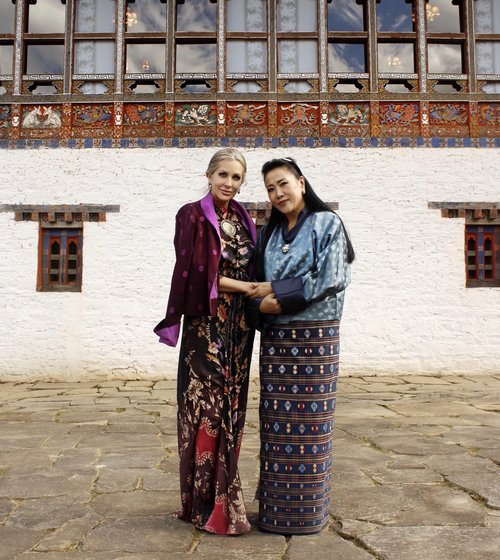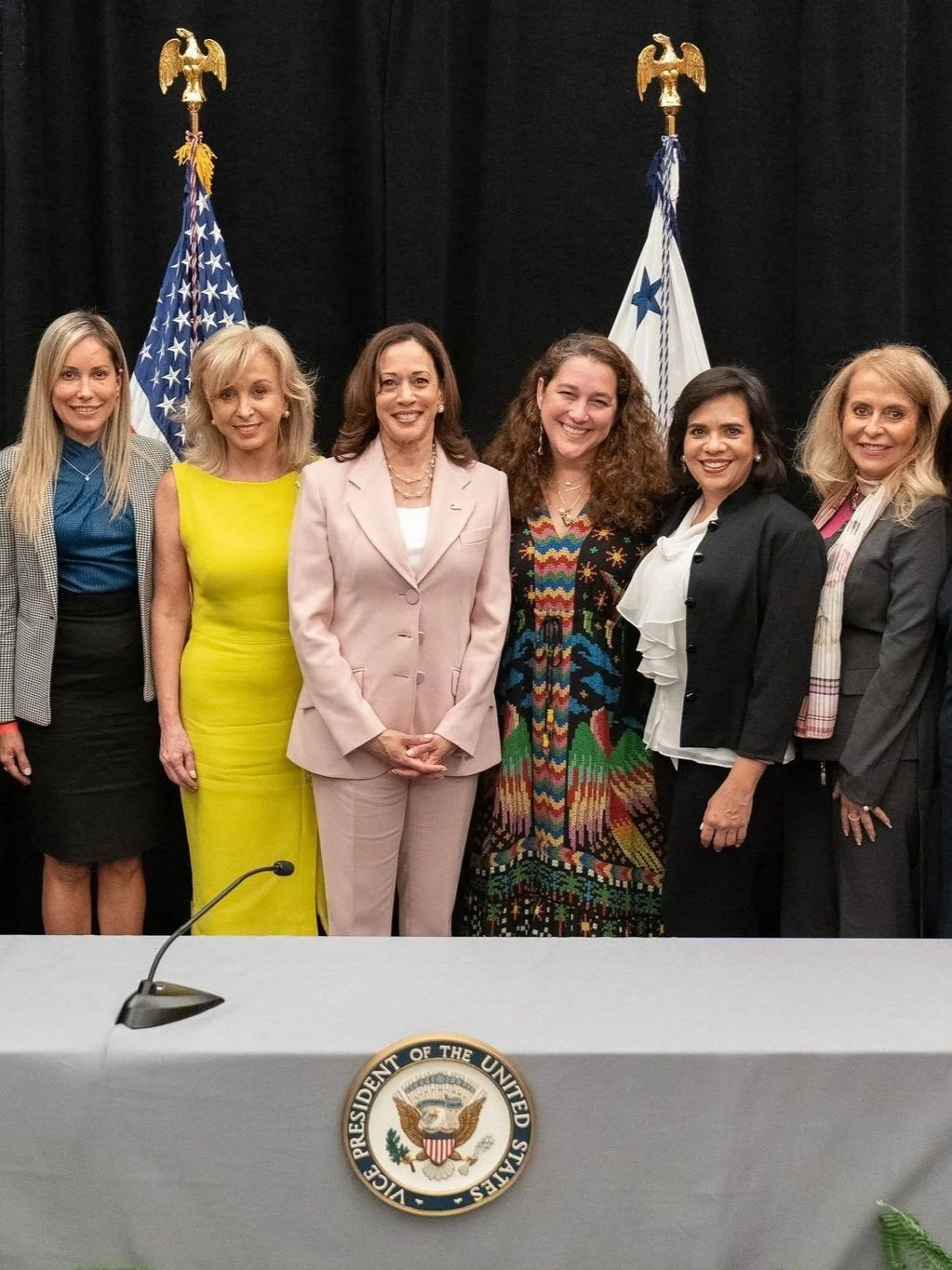Proof of mass-consumerism, an ecosystem we’ve created, where the story behind the product is undervalued and even forgotten.
I have been traveling the world and supporting global artisans, artists and emerging designers for as long as I can remember. This respect for craft was borne out of my upbringing and heritage - values that I inherited from my parents. As avid travellers, the trips they took me and my siblings on were never normal holidays, but were part of an awareness and a discipline to understand that we all are connected though we have different upbringing and cultures. We were taught that we owed it to humanity and ourselves to respect others the same way we respect ourselves. This was meant to promote understanding of other perspectives on life by studying and appreciating other customs, social norms, religions and creativity.
In San Jose, Costa Rica , at a sustainability conference with my great friend of over 25 years, PACUNAM CEO Marianne Hernandez.
So we travelled. We became part of the ecosystem of our environment through being close to nature, and learning about the respective cultures, religions and well-being practices of where we were. We also donated and supported local charities, aiming to leave every place a little better than how we found it. Fuelled by this ethos, I have personally donated to and invested in over 50 charities, artisans, emerging designers and entrepreneurs, and have invested and co-invested to create a portfolio of disruptive, forward-thinking companies, those that encourage efficiency by selling through at full price and avoiding waste, all of which can help sustain luxury fashion from diverse sources.
With Isabella Springmuhl Tejada, a leading Guatemalan designer with Downs Syndrome - and an inspiring story.
With CoutureLab, a company 100% owned by me, I had the privilege to use the platform as my own laboratory to continue my passion in a non-profit way, and promote the importance of the story behind the products, exhibits, accessories, clothes and home gifts that went beyond seasons and trends, and help more than 288 artisans and emerging designers.
With all of this said, as a conscious consumer and an investor, having devoted much of my life, energy and resources to see luxury fashion develop into being a conscious system, last year has left me unnerved. From the looming of Brexit and its inevitable impact on the fashion industry, to the witch-hunt manner in which we have started to hate and vilify people and brands over their mistakes, we risk moving further from conscious consumerism. I believe it constructive to voice your opinion on bad behaviors from designers, but think it counterproductive to automatically move to measures like boycotts that can debilitate businesses and threaten the jobs of well-meaning people who work for those designers.
With CoutureLab Coalition Founding Members Donna Karan and Livia Firth, at Donna’s Urban Zen headquarters in NYC.
Our responsibilities as fashion consumers go beyond this. Perhaps we should use our influence to create less stardom for designers and more equilibrium by uplifting the creative teams supporting those artisans and the people working extensive hours in order to fulfil an individual creative vision. No designer makes a collection by her or himself, so think twice about the people and team who support the designer. Make sure any criticism is aimed at her or him and not the people who support the designer. The board, investors and CEO should also be held accountable, as any major fashion company is a collaboration of many.
With Stephanie von Watzdorf, founder of Figue, a sustainable artisan-led brand I invest in.
What is conscious consumerism? It is certainly a key part of any sustainability narrative. Essentially, conscious consumerism focuses on making positive decisions throughout the buying process, with the intention of helping to balance the clear negative impacts that consumerism has on the planet. This can include many facets and elements. There is no one way to be conscious or sustainable, but rather a variety. From supporting ethical businesses and donating to textile research, to minding one's own consumption and demanding transparency and respect for human rights from companies, there are many ways to offset the negative impacts of consumerism.
In Bhutan with her majesty the Queen Mother, who I am working with on a number of initiatives to promote local artisans.
We do need to change our fashion system and many rules and current practices in it, but it is not part of sustainability to leave people without jobs in one of the most precarious economic environments we've had. Fashion is not dead, it's simply unconscious. Conscious investing on my part was never a path about simply making money, it was about a path of supporting necessary ideas. Sometimes these ideas were too early, but good ideas and good founders do not die, they transform into something else. Good ideas are owned not by one good founder but by a good founder who knows how to lead the best team at the right time with the right partner investors. I know that hard-won sustainable or conscious systems won’t always be immediately lucrative. I push sustainability and profitability in a company more than growth when I am a majority shareholder with veto rights. I am not flexible when it comes to not being efficient with smallest capital possible. We need to be profitable, deliver a good product and make economically effective and efficient companies by avoiding waste and discounting and over stocking. By doing this we are helping our fashion system to become more sustainable and more economically viable. From 2019, simply creating more economically flawed companies and more products we do not need, even with recyclable and sustainable materials, is not helping the planet.
Be a conscious consumer and learn the story behind your product. Support companies that are making an impact, generating jobs, or small companies and designers that are profitable, or artisans or vintage, or simply rent your clothes, or rent out your closet.
At the Artisan GuateMaya event in Guatemala organized by PACUNAM, where I spoke, chaired several panels, and a number of the country’s artisanal groups were represented.
Avoid buying more clothes from companies that are using sustainability primarily as a marketing tool. Become a conscious consumer by asking yourself why you are buying what you are buying. Is it clothing for the long run, or is it a fleeting trend?
We all have a role in creating conscious fashion consumerism. I love this business. It is my life and it has been good to me. I certainly intend to concentrate my efforts going forward on carrying forth the mentality and practice of respect and love for genuineness and diversity. I look forward to working with many of my long-time friends, colleagues, past and current business partners and emerging companies and individuals with the new important ideas that will move our important endeavors into a more conscious and productive environment.
With Livia, Donna and CFDA president and CEO Steven Kolb in Guatemala.
Read more about the trip here.
Our first day in Guatemala, visiting the Utz Epejtiik artisanal cooperative with Stephanie von Watzdorf, John Skipper, Celina de Sola, Livia Firth, Steven Kolb, Carolina Kleinman, Marianne Hernandez, Donna Karan.





















